Heating boilers for questioning: varieties and selection
Heating a country house is a task whose solution rests on the shoulders of the owner of a country plot. It is important not only to design and build an efficient coolant circulation system, but also to choose the right heating boiler.
We want to help the average man to understand the varieties and features of the most relevant models of modern boilers for the country.
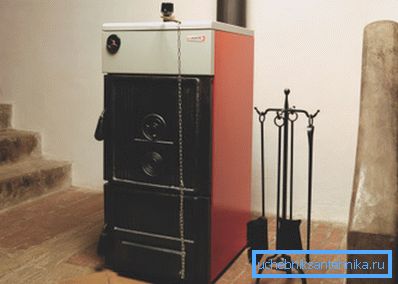
Heating boilers for summer cottage
Requirements and features
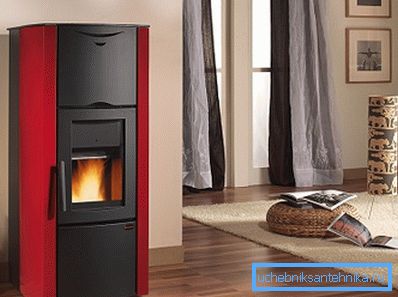
There are many ways to heat the coolant for water heating, because today there are very different types of fuel and energy sources available: natural gas, various hydrocarbons, petroleum products, firewood, peat, coal, electricity and others.
However, it should be immediately noted that we are talking about a country house, which is characterized by such features:
- Most often the house is not connected to the natural gas supply line. This is one of the saddest flaws, since the main gas is the cheapest and one of the most convenient types of fuel;
- The electric network of the holiday village also has its drawbacks: as a rule, it is limited by the capabilities of the two phases and the wiring characteristics. Such a network will cope with air conditioning, but unfortunately it will not be able to pull a powerful boiler. In addition, frequent accidents and shutdowns are possible, and devices whose power exceeds 3.5 kW does not allow the user to plug in the socket;
- The mode of visiting the summer cottage in the cold season is periodic and short-term.. Therefore, the system should be designed for low temperatures (the coolant should not freeze);
- A winter visit to a dacha is usually limited to one to two days, so the system should quickly warm up a cooled down house.. To do this, use boilers with excess power, forced circulation of coolant, large diameter pipes and aluminum radiators.
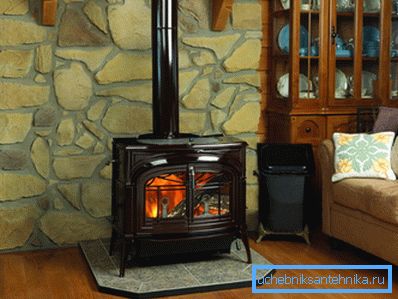
Note! In addition to these features, you should consider the possibility of interruptions with one or another type of fuel, so it is better to have a backup option. To do this, purchase devices that can burn several types of fuel.
Having considered the features of the dacha heating, we can identify the basic requirements that the oven must meet:
- Ability to work on available for your area of fuel. This may be firewood, diesel fuel, peat, coal, pallets, or combinations thereof;
- The ability to quickly warm the house cooled to negative temperatures. Here you need the right choice of power unit and the correct calculation of the heating system;
- The heat exchanger should calmly respond to antifreeze as heat transfer agents: propylene glycol, ethylene glycol and their other types should not be a danger to the materials of the boiler.
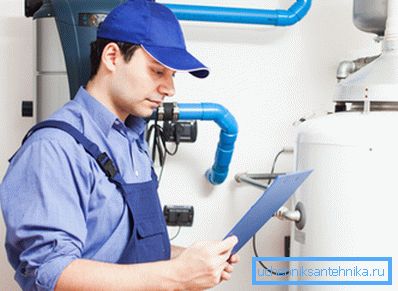
Note! There is no universal solution that is suitable for everyone and everything, so you will have to study the pros and cons of different models in order for your choice to be as balanced as possible.
Species
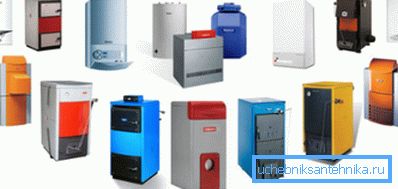
There are many ways to classify furnaces, and basically they come down to three approaches: by type of construction, principle of operation, and by type of fuel. We will not consider structural nuances and differences, but focus on the more essential criteria for country conditions - the types of fuel used.
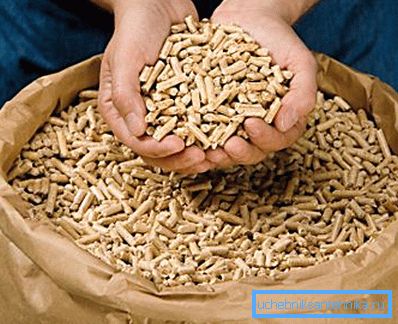
Note! As was shown, gas and electricity are not suitable for us, so we will focus our attention on solid fuel, diesel and combined types.
Wood aggregates
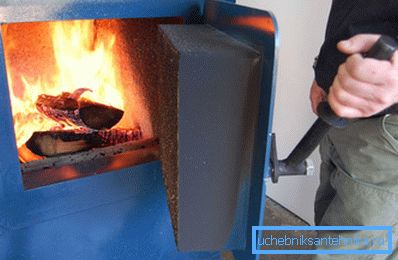
Despite technological advances, the popularity of wood as a fuel remains high. This is due to the wide distribution of this material, its availability and price. After natural gas, firewood is the cheapest type of fuel.
The wood heating boiler for the dacha does not have a complex structure, and therefore it is reliable and easy to maintain. On the other hand, this makes it dependent on the operator’s participation in adjusting the work. (See also the article Electric heating convectors: features.)
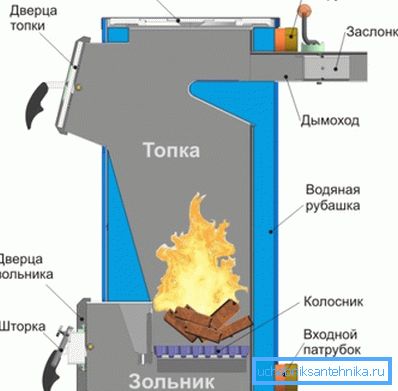
Advantages of the wood unit:
- The price of wood fuel is not much higher than the cost of main gas in terms of kilowatt-hours of energy produced;
- Often the suburban area is located near the forest, which makes it possible to collect brushwood, deadwood and deadwood. This is a significant cost savings;
- The firewood boiler has a fairly simple design, which increases its reliability and facilitates repair and maintenance;
- Not only firewood can be used as fuel, but also briquettes, wood chips, waste, etc .;
- Burning wood gives a pleasant smell and a special comfort.
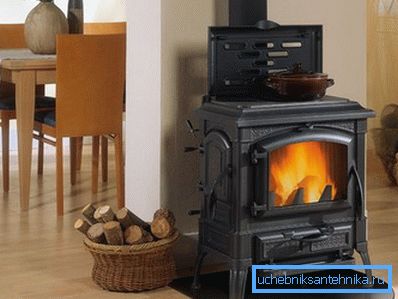
If we talk about the shortcomings, they are also available:
- The need to throw wood with their own hands. Solid fuel can not be fed into the furnace automatically, so your participation in the heating process is not discussed;
- Adjustment of the temperature of the coolant in many models is done manually by manipulating the position of the valve;
- Firewood must be stored under a canopy and kept as dry as possible;
- The need to frequently add fuel - once every 4 - 6 hours, which is extremely inconvenient at night.
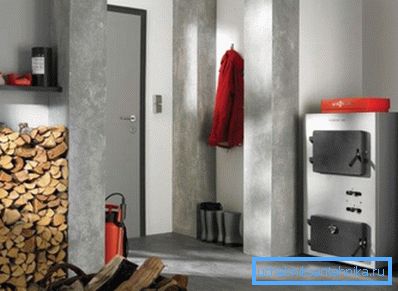
Note! Wood stoves and boilers are suitable for summer residents, whose financial capabilities are limited, as well as for those who live near the forest.
Diesel units
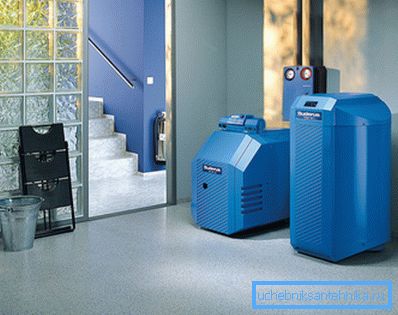
The most convenient and technological diesel boilers for the dacha. These devices are not inferior to gas furnaces neither in the possibilities of automation of the process, nor in the possibilities of self-regulation and self-tuning of the system operation. Their only disadvantage is the high cost of diesel fuel.
Advantages of diesel ovens:
- Automatic control of the temperature of the coolant, and in more modern models - control of air temperature in the room;
- Fully autonomous work without the operator in the process of supplying diesel fuel;
- The possibility of remote control using GSM and embedding in progressive systems "smart home" and the like;
- In the process of burning does not arise debris, ash and other unwanted products.
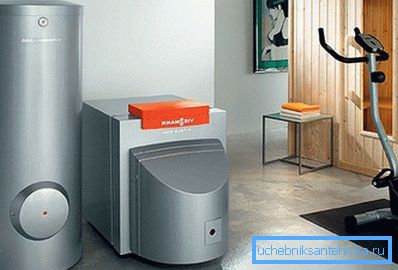
Among the shortcomings mentioned high cost of diesel fuel, the difficulties of ignition at low temperatures and a noisy burner. However, there is a way to overcome the first and main drawback: the boiler is able to work on waste oil, the cost of which is several times lower than diesel fuel.
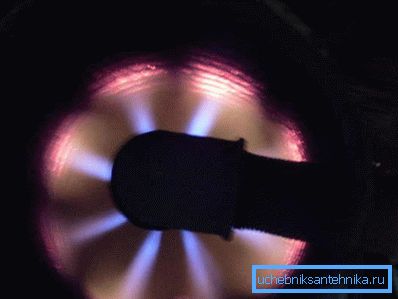
Note! The diesel unit is suitable for people who do not spare funds for comfort, as well as those who have constant access to waste oil.
Combined devices
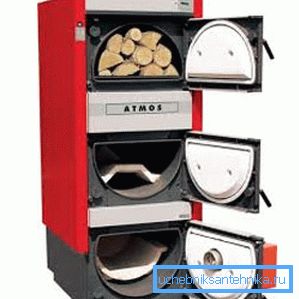
Better than others, combined heating boilers are suitable for the conditions and requirements of country systems. These are devices capable of operating on different energy sources: wood and gas, wood and electricity, diesel fuel and gas, and other combinations.
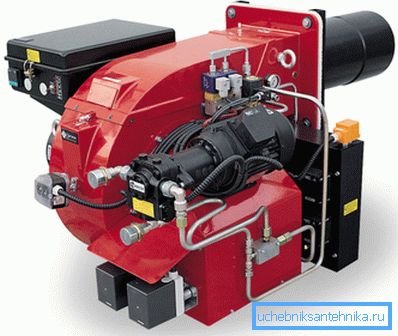
The advantages of using these types are obvious: it is the possibility of saving depending on current prices, and independence from any single material, and reliability in terms of supply drops of a particular type of fuel.
The constructional combined approach is implemented by various means. There are models with two or more combustion chambers, models with interchangeable and universal burners, models with a common firebox, etc.
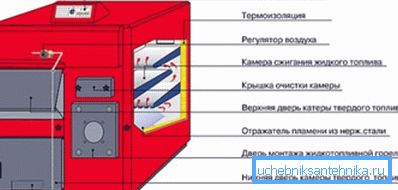
Note! The main criterion for choosing a combined boiler is the ability to quickly and easily switch from one energy source to another without the participation of specialists or professional tuners.
Conclusion
Conditions and features of a country economy impose a number of requirements on heating devices and units. The most suitable for these conditions are solid fuel, diesel and combined devices. To get a better impression, watch the video at the end of the article.